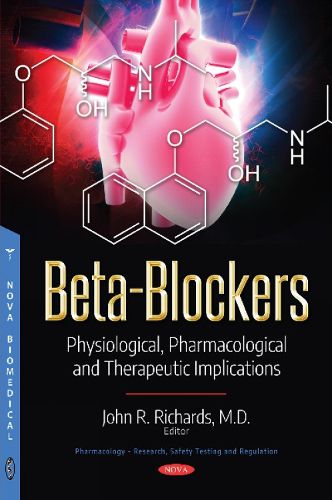Readings Newsletter
Become a Readings Member to make your shopping experience even easier.
Sign in or sign up for free!
You’re not far away from qualifying for FREE standard shipping within Australia
You’ve qualified for FREE standard shipping within Australia
The cart is loading…






In the late 1950s, Sir James Black made a tremendous contribution to pharmacology and medicine with his discovery of -blockers. After the first -blockers became available in the 1960s, these drugs were noted to have beneficial effects in reducing morbidity and mortality from ischemic heart disease. It soon thereafter became apparent that blocking the adverse effects of the sympathetic nervous system could benefit many other diseases. As research and development continued, later generations of -blockers appeared, each with unique properties such that it is now impossible to group these agents into one class to uniformly describe their effects. In this edition of Beta-Blockers: Physiological, Pharmacological and Therapeutic Implications, the authors examine how -blockers have evolved from their origin as a treatment for angina to a myriad of other related and unrelated medical conditions. These include (in order of appearance), heart failure, hypertension, sepsis, tachydysrhythmias, portal hypertension, variceal bleeding, stimulant toxicity, thyrotoxicosis, obstructive lung disease, trauma, pheochromocytoma, cancer, acute coronary syndromes, and coronary arterial disease. The authors of these chapters hail from a spectrum of medical specialties as diverse as the indications for -blockers: anesthesiology, cardiology, critical care, emergency medicine, gastroenterology, hematology/oncology, internal medicine, pharmacology, pulmonology, surgery, and toxicology. In this book, we also discuss controversies as well as the evolving and changing indications and contraindications for the use of this amazing class of drugs. This book will be of interest to physicians, pharmacists, nurse practitioners, physician assistants, nurses, research scientists, and informed patients.
$9.00 standard shipping within Australia
FREE standard shipping within Australia for orders over $100.00
Express & International shipping calculated at checkout
In the late 1950s, Sir James Black made a tremendous contribution to pharmacology and medicine with his discovery of -blockers. After the first -blockers became available in the 1960s, these drugs were noted to have beneficial effects in reducing morbidity and mortality from ischemic heart disease. It soon thereafter became apparent that blocking the adverse effects of the sympathetic nervous system could benefit many other diseases. As research and development continued, later generations of -blockers appeared, each with unique properties such that it is now impossible to group these agents into one class to uniformly describe their effects. In this edition of Beta-Blockers: Physiological, Pharmacological and Therapeutic Implications, the authors examine how -blockers have evolved from their origin as a treatment for angina to a myriad of other related and unrelated medical conditions. These include (in order of appearance), heart failure, hypertension, sepsis, tachydysrhythmias, portal hypertension, variceal bleeding, stimulant toxicity, thyrotoxicosis, obstructive lung disease, trauma, pheochromocytoma, cancer, acute coronary syndromes, and coronary arterial disease. The authors of these chapters hail from a spectrum of medical specialties as diverse as the indications for -blockers: anesthesiology, cardiology, critical care, emergency medicine, gastroenterology, hematology/oncology, internal medicine, pharmacology, pulmonology, surgery, and toxicology. In this book, we also discuss controversies as well as the evolving and changing indications and contraindications for the use of this amazing class of drugs. This book will be of interest to physicians, pharmacists, nurse practitioners, physician assistants, nurses, research scientists, and informed patients.